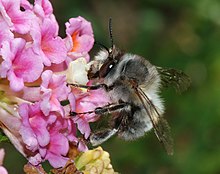Anthophorini
| Anthophorini Temporal range: Late Oligocene – Holocene |
|
|---|---|
 |
|
| male Anthophora plumipes | |
| Scientific classification | |
| Kingdom: | Animalia |
| Phylum: | Arthropoda |
| Class: | Insecta |
| Order: | Hymenoptera |
| Family: | Apidae |
| Subfamily: | Apinae |
| Tribe: | Anthophorini |
| genera | |
The Anthophorini are a large tribe in the subfamily Apinae of the family Apidae. Species in this tribe are often referred to as digger bees, although this common name is sometimes also applied to members of the tribe Centridini. It has over 750 species worldwide that were previously classified in the family Anthophoridae; the vast majority of species are in the genera Amegilla and Anthophora.
All Anthophorini species are solitary, though many nest in large aggregations. Nearly all species make nests in the soil, either in banks or in flat ground; the larvae develop in cells with waterproof linings and do not spin cocoons.
The characters used to define this group are subtle, but they are nonetheless fairly recognizable.
...
Wikipedia
